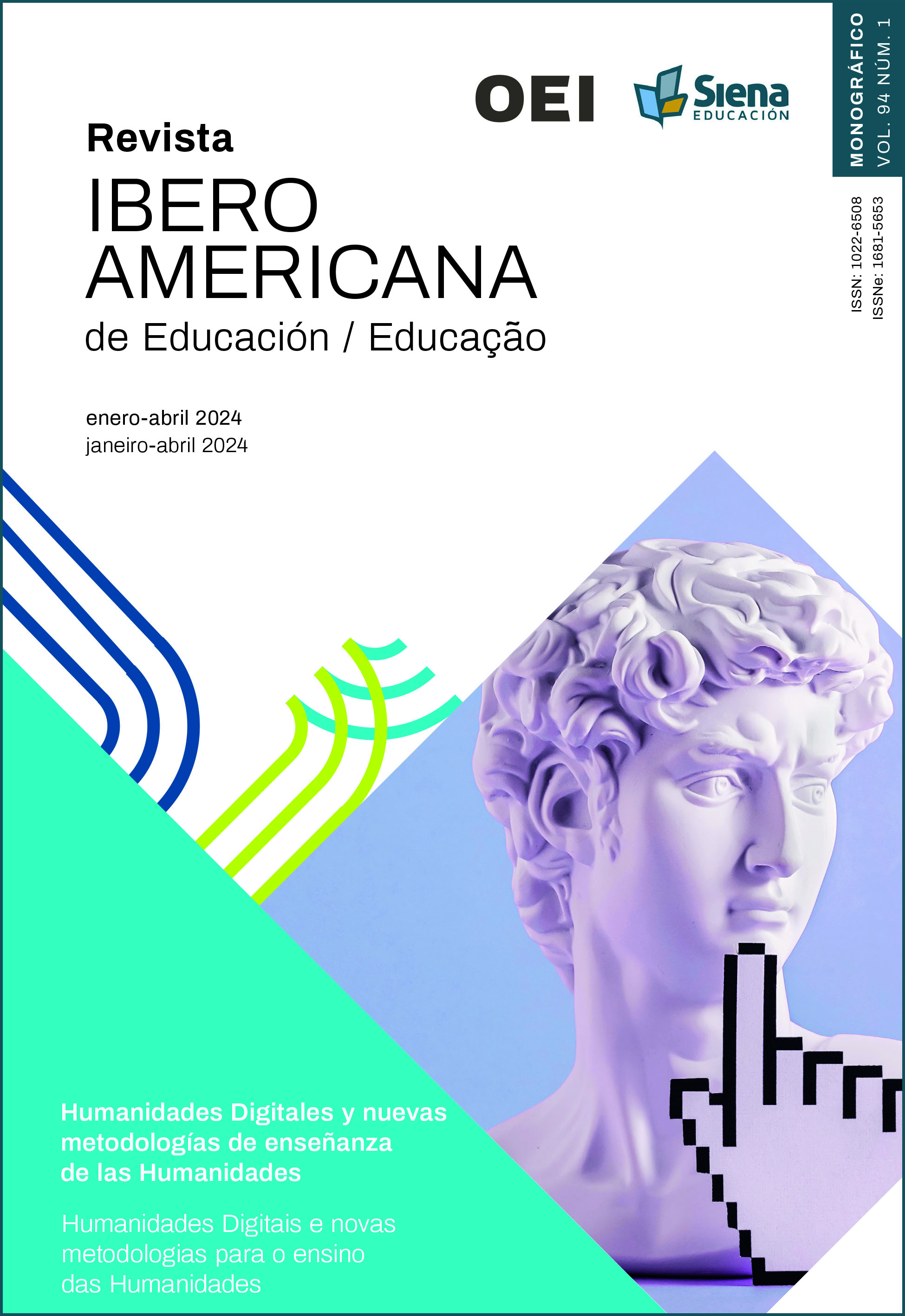Digital humanization in remote education: challenges experienced by basic education teachers in the pandemic overview
DOI:
https://doi.org/10.35362/rie9416072Keywords:
Digital culture, Teacher training, Digital mobile technologiesAbstract
Mobile Digital Information and Communication Technologies (MDICT) are increasingly present in the daily lives of people around the world, as well as in various daily activities, including educational activities. The article's general objective is to describe the strategies adopted by the Government of one of the Brazilian States, located in the Northeast, in the face of the pandemic scenario, as well as the challenges experienced by teachers in the state education network in carrying out their teaching practices in conjunction with the remote classes. The methodology adopted was based on the qualitative approach and the study of multiple cases according to Yin (2015). It comes to the conclusion that there is a need for greater investment on the part of the government, not only in terms of infrastructure that supports the MDICT, but for the continued training of teachers. Remote teaching implemented during the pandemic period did not fully meet the needs and demands of students, and among the main difficulties experienced by teachers working in this scenario, the need to seek, on their own, training related to the pedagogical use of digital technologies stood out.
Downloads
References
Alves, M. M. S. (2023). Tecnologias móveis para formação docente: validação de um instrumento de identificação de vulnerabilidade digital. Tese (Doutorado em Educação) – Universidade Federal de Sergipe, São Cristóvão. http://ri.ufs.br/jspui/handle/riufs/17609
Arruda, E. P. (2020). Educação Remota Emergencial: elementos para políticas públicas na educação brasileira em tempos de Covid-19. Em Rede - Revista de Educação a Distância, 7(1), 257-275. https://bit.ly/3xWspff.
Bardin, L. (2016). Análise de conteúdo. Tradução Luís Antero Reto, Augusto Pinheiro. São Paulo: Edições 70.
Biernacki, P., & Waldorf, D. (1981). Snowball Sampling: Problems and Techniques of Chain Referral Sampling. Sociological Methods & Research, 10(2), 141-163. https://doi.org/10.1177/004912418101000205.
Brasil (2017). Base Nacional Comum Curricular: Educação Infantil, Ensino Fundamental e Ensino Médio. Brasília: MEC/Secretaria de Educação Básica, 2017. https://bit.ly/46bPI5H.
Brasil (1996). Lei de Diretrizes e Bases da Educação Nacional, LDB. 9394/1996.
Camargo, B. V. & Justo, A. M. (2013). IRAMUTEQ: um software gratuito para análise de dados textuais. Temas em Psicologia, 21(2), 513-518. https://bit.ly/4b0aUPb.
Ferreira, G. R. A. M. & Barzano, M. A. L. (2020). Web currículo e diálogos com as tecnologias digitais no contexto ambiental da cibercultura. Revista e-Curriculum, São Paulo, 18(2), 657-675. https://bit.ly/3HpqSES.
Moreira, J. A., Henriques, S., & Barros, D. M. V. (2020). Transitando de um ensino remoto emergencial para uma educação digital em rede, em tempos de pandemia. Dialogia, 351-364.https://bit.ly/3OegR14.
Rondini, C. A. et al., (2020). Pandemia da Covid-19 e o ensino remoto emergencial: mudanças na prática pedagógica. Interfaces Científicas, Aracaju, 10(1), 41-57. https://bit.ly/492RWW5.
Santos, W. L., Souza Ferrete, A. A. S., & Santos Alves, M. M. (2020). A produção do conhecimento sobre Facebook e educação no portal de periódicos da CAPES: relatos de experiências docentes. Revista Exitus, 10. https://go.oei.int/ecjkjyaj
Santos, W. L. et al. (2021). Cenários virtuais de aprendizagem como recurso pedagógico diante da pandemia do novo coronavírus: relatos das experiências docentes. Educação (UFSM), 46 (1), 21-27. https://go.oei.int/gs7onafp
Saviani, D. & Galvão, A. C. (2021). Educação na pandemia: a falácia do “ensino” remoto. ANDES-SN, 36-49. https://bit.ly/4b3pLZ4.
Sergipe. (2020a). Secretaria de Estado da Educação, do Esporte e da Cultura Conselho Estadual de Educação. Resolução Normativa Nº 4, de 2 de abril de 2020.
Sergipe. (2020b). Secretaria de Estado da Educação, do Esporte e da Cultura Conselho Estadual de Educação. Portaria Nº 2235/2020/GS/SEDUC de 27 de maio de 2020b.
Sergipe. (2020c). Governo do Estado. Secretaria de Estado da Educação, do Esporte e da Cultura Conselho Estadual de Educação. Decreto Nº 40.615 de 15 de junho de 2020c.
Sergipe. (2020d). Secretaria de Estado da Educação, do Esporte e da Cultura Conselho Estadual de Educação. Portaria Nº 4082/2020/GS/SEDUC de 26 de outubro de 2020d.
Sergipe. (2020e). Secretaria de Estado da Educação, do Esporte e da Cultura Conselho Estadual de Educação. Portaria Nº 4177/2020/GS/SEDUC de 06 de novembro de 2020e.
Sergipe. (2022a). Secretaria de Estado da Educação, do Esporte e da Cultura Conselho Estadual de Educação. Portaria Nº 0532/2022/GS/SEDUC de 18 de fevereiro de 2022.
Sergipe. (2022b). Secretaria de Estado da Educação, do Esporte e da Cultura Conselho Estadual de Educação. Portaria Nº º 0953/2022/GS/SEDUC de 24 de março de 2022.
Souza, M. A. R. et al. (2018). O uso do software IRAMUTEQ na análise de dados em pesquisas qualitativas. Rev. Esc. Enferm. USP, 52, 1-7. https://doi.org/10.1590/S1980-220X2017015003353.
UNESCO - Organização das Nações Unidas para Educação, Ciência e Cultura. (2021). Avaliação do desenvolvimento da Internet no Brasil. https://bit.ly/3SfTHsu
Yin, R. K. (2015). Estudo de caso: planejamento e métodos. 5. ed. Bookman.
How to Cite
Published
Issue
Section
License
Copyright (c) 2024 Iberoamerican Journal of Education

This work is licensed under a Creative Commons Attribution 4.0 International License.
Any authors who publish with this journal accept the following terms:
















